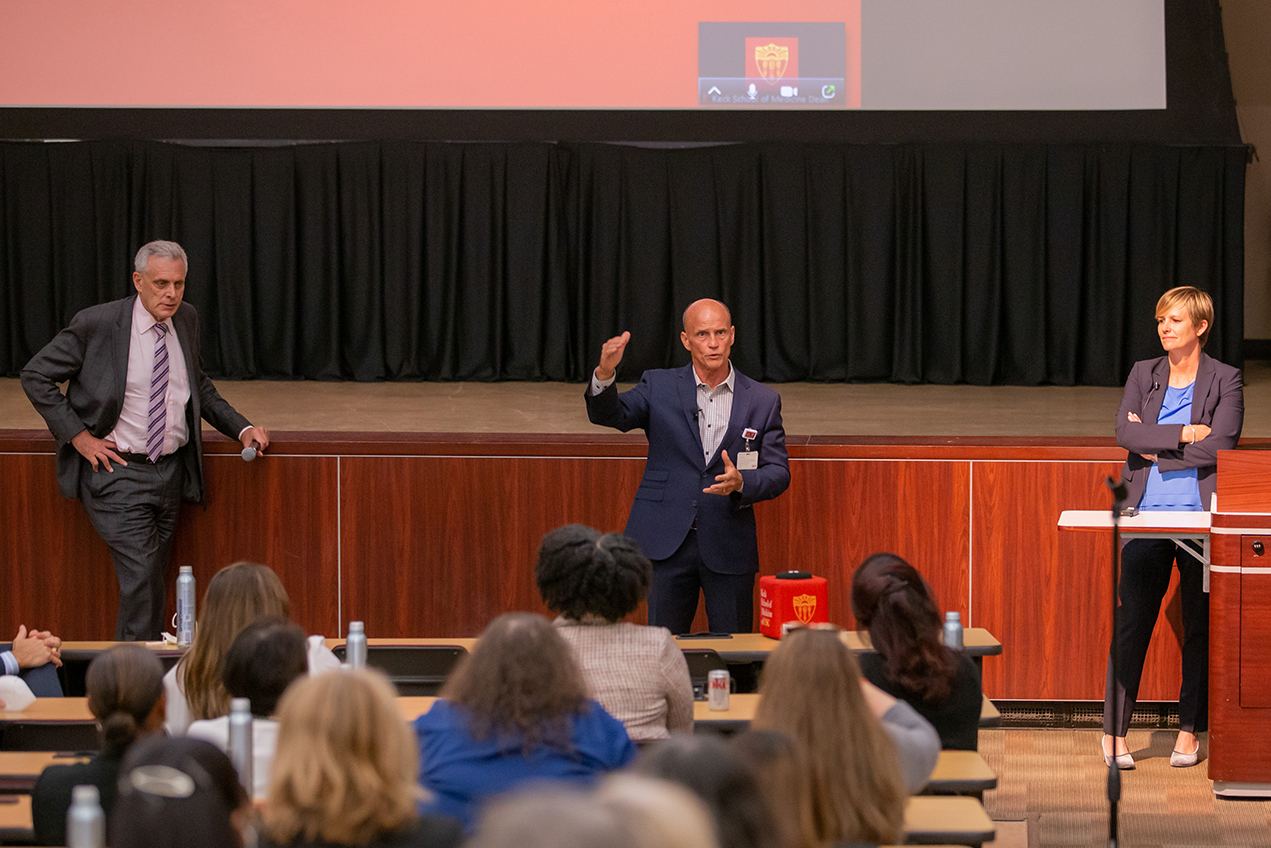On October 14, employees and leadership from across the Keck Medicine of USC enterprise descended upon Mayer Auditorium on the USC Health Sciences Campus. For many individuals gathered on this overcast day, it was the first time they had seen each other in person since the start of the COVID-19 pandemic, and they proceeded to fill the space with laughter and words of gratitude.
At 1 p.m., the guests took their seats and were greeted by Rod Hanners, BS, chief executive officer for Keck Medicine, who welcomed them to the first in a series of leadership town-hall style meetings. The purpose of this gathering was to address the state of the health system and its goals and strategies for growth and investment.
Joining Hanners were Steven Shapiro, MD, senior vice president of Health Affairs at USC, and Shawn Sheffield, MBA, MHSA, chief strategy officer for Keck Medicine.
Shapiro began the meeting by addressing the topic of health care in volatile times. According to the American Hospital Association, hospital and health system executives have grappled with how to lead, create a vision for success, and inspire innovation when it’s difficult to see what’s on the horizon for the industry. Shapiro acknowledged that although the COVID-19 pandemic enabled digital care for patients to accelerate, making high-tech hospitals indispensable to communities, the evolving health care landscape and economic pressures continue to squeeze health system margins.
“The fact is, unaffordable and inaccessible health care, combined with an aging population, can undoubtedly overwhelm the economy and prevent us from serving our communities to the fullest,” said Shapiro. “Now more than ever, it is essential that health sciences schools unite to drive interprofessional education, value-based care and novel research.”
For Shapiro, the evolution of clinical care will require merging with the latest research tools. To obtain improved outcomes across the medical enterprise, several key factors will be necessary. These include state-of-art care, such as access and evidence-based medicine; value-based care, which will eliminate low-value medicine; precision medicine, which will focus on the individual disease along with its risk, course and treatment; and improved therapies, utilizing new knowledge and translational science.
“We are on the cusp of not only better understanding diseases, but deciphering the molecular basis for these diseases,” continued Shapiro. “We have a great vision for USC moving forward, and our talented clinicians and researchers are poised to make a significant impact on our communities.”
The program continued with Hanners discussing recent expansion efforts across the enterprise, as well as the health system’s FY23 goals, which include people, safety and quality care, service and access, and growth and financial performance. Hanners also stressed the importance of hiring the best and brightest minds from around the country to oversee the enterprise’s evolving journey. Some recent notable hires include Ekta Vyas, PhD, chief human resources officer for Keck Medicine; and Shannon Bradley, MBA, Keck Medicine’s first chief diversity and inclusion officer.
“We have to get serious about acting like a health system,” Hanners said. “Besides working to improve growth and financial performance, it is essential that we create a culture that inspires and nurtures our workforce; one that involves safety in the workplace and promotes tolerance and eliminates institutional bias. We have a tremendous team here, and the future is brighter than ever.”
Keck Medicine’s journey began in 2009, when USC acquired the USC University Hospital and USC Norris Cancer Hospital. In 2011, USC received a naming gift from the W.M. Keck Foundation, and the medical enterprise officially became Keck Medicine of USC. Since then, Keck Medicine has grown to include 4 hospitals; 967 patient beds; 80 plus satellite locations and clinics; and more than 8,500 employees.
During her presentation, Sheffield recognized some of the enterprise’s major growth and expansion efforts in recent times. These include the acquisition of USC Arcadia Hospital in July 2022; the expansion of oncology services with the opening of a 33,000 square foot clinic in Newport Beach; and a collaboration between Henry Mayo Newhall Hospital and Keck Medicine to bring advanced cancer-care services to the Santa Clarita Valley and surrounding areas.
“To fully realize our strategies for growth, we need to expand our network and access, increase capacity across the system and ensure consumer engagement,” said Sheffield. “Our goal is to serve our communities to the fullest, and we will continue to seek out opportunities where we can provide incredible patient care to communities in need.”
In the coming years, a series of high-profile construction and upgrade projects will also allow Keck Medicine greater reach throughout Southern California. These include the creation of a new infusion center, day hospital and clinical trials headquarters at USC Norris Cancer Hospital, as well as the opening of a 100,000 square foot ambulatory site in Pasadena. The site will be Keck Medicine’s largest satellite clinic, and is expected to see its first patients in 2024.
As the program drew to a close, the three leaders acknowledged that there are still many challenges ahead. But, with the talents and dedication of health system staff, the group reiterated their excitement for the future.
“We’ve had to confront so many unique obstacles over the past two years,” said Hanners. “Through all the uncertainty though, we’ve never wavered in our commitment to both our communities and our workforce. Keck Medicine’s journey has only just begun.”
The remaining events in this series of leadership meetings are open to all Keck Medicine staff members. The upcoming dates are as follows:
- November 7, 1 p.m. to 2:30 p.m.: Alhambra Campus, A7, Lower Level Auditorium
- November 14, 3:30 p.m. to 5:00 p.m.: USC Verdugo Hills Hospital Council Rooms
- November 21, 9:00 a.m. – 10:30 p.m.: USC Arcadia Hospital, Vance Auditorium
— Matthew Vasiliauskas


